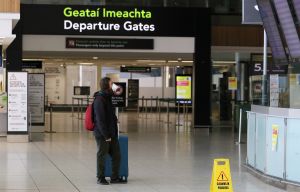THE Public Accounts Committee have slammed the Department of Education for spending a whopping €1.7million each year posting payslips to teachers.
The Committee has also criticised the €56million spent on prefabs over the past two years and has instructed that the Department review their spending in these areas and make the necessary changes recommended.
Sinn Fein’s Brian Stanley TD, Chair of the Public Accounts Committee, has today published a report on the Department of Education, instructing them to do much more to ensure that the taxpayer is protected during the process of urgent procurement contracts.
The report stems from a meeting between the Committee and the Department of Education on October 21, 2020, following a procurement process on the calculated grades system and the Leaving Certificate.
In 2018, a gross expenditure of €9.81billion was recorded. In 2019, gross expenditure increased by 5.7 per cent to €10.37billion.
Based on its examination, the Committee found that the Department of Education spent €13.8million on postal and telecommunication services over a six-year period.
€10.2million of this was spent on posting payslips to some 130,000 members of school staff on a fortnightly basis.
The Committee made clear their dissatisfaction and said that “a modern State organisation could expend approximately €1.7million annually in a more productive manner than posting payslips.”
‘A MATTER OF URGENCY’
The Department also revealed it operates four separate payroll systems with a range of “complex circumstances”.
This includes 9,000 casual employees and a varying number of employees on approved leave, that need to be taken into account before any system upgrade commences.
The Department informed the Committee that therefore it would take an estimated three to four years to develop and implement an electronic system to replace paper payslips.
The Department told how they intend to explore an interim payroll upgrade at the end of 2021, however, the Committee have recommended this be done sooner, “as a matter of urgency”.
The Committee noted that an electronic payroll system would represent value-for-money for the State in the long-term.
They also requested that the Department of Education provide the Committee with a detailed timeline for the implementation of this recommendation by quarter three 2021 and that the Department keep the Committee appraised of progress on an annual basis.
TEMPORARY FACILITIES
The Committee also questioned whether school prefabs were providing value-for-money for the State.
Expenditure on temporary school accommodation in 2018 was €26.2million – increasing to €29.5million in 2019.
It was found that the longest arrangement for temporary school accommodation dated back to March, 2000.
The Committee expressed their concern that the Department of Education is relying too heavily on temporary accommodation for students and argued that accommodation dating back 20 years cannot be classified as an interim or temporary measure.
The Department explained that the school-going population has increased over the last decade, thus the need for more school accommodation.
They told how they view prefabs and temporary facilities alike as interim measures to provide school spaces and that they have increased their spend on capital projects to address such temporary arrangements.
The Committee recommended the Department undertake a review of all temporary accommodation agreements for schools that have been in operation for more than five years in order to ensure value for-money is achieved in the long term.
They also instructed that the review process be completed by the end of the year, with a copy of the findings provided to them.
Lastly, the Committee recommended the Department conduct a re-evaluation of all school extension proposals and the Department of Public Expenditure and Reform ensures the reasons for delays in capital projects across all sectors are published.
EXPOSE RISK TO TAXPAYERS
Other concerns raised by the Committee include the lack of oversight where defective buildings – funded by the Department of Education – have been constructed.
They recommended the Department of Education place significant
attention on the need for a full-time clerk of works or other suitable qualified person to be on site during all large construction projects and that regular inspection of all other projects takes place.
The report also stated the Committee’s recommendation that the Department of Education continue to strive for high standards of oversight and risk management with regards to its procurement process.
In addition, the Department should liaise with the Department of Public
Expenditure and Reform to ensure that any risks that taxpayers are exposed to when Departments undertake accelerated procurement contracts are minimised.
The Education Department was found to have spent over €2.2million in 2018 on legal costs for the education sector.
The Committee acknowledged the information provided by the Department as to the reasons why legal costs were substantially higher than claims rewards, however, they remained concerned that the true cost of legal claims against the Department were not being reported with sufficient clarity.
They therefore recommended that the Department of Public Expenditure and Reform liaise with the Office of the Comptroller and Auditor General to examine whether additional clarity and transparency could be achieved.
CARANUA
The report also covered Caranua and called on the Department of Education to work with the survivor organisation to learn lessons for future redress schemes.
Caranua is the name of the Residential Institutions Statutory Fund, which is administered by the Fund’s Board. It will cease to exist on March 24, 2021.
It was noted that the Committee sought confirmation that all survivors’ cases would be completed before the dissolution of Caranua, but the Department said that Caranua is responsible for any outstanding appeals and cases as it moves towards its completion date.
The Committee was informed that direct expenditure from the Fund will not continue after the dissolution of Caranua.
Commenting on Caranua, Mr Stanley said: “We are still awaiting legislation from the Department which will dissolve the organisation and we want to see a timelime presented to the Committee for that process.
“We also want to ensure that there are on-going supports established for survivors once Caranua is dissolved and that the Department engages with the organisation to learn from its experience to incorporate minimise risk findings into future redress schemes.”
Speaking at the publication of the report, Laois/Offaly TD added: “It is the job of the Public Accounts Committee to ensure that the taxpayer receives value for money.
“To achieve this objective, we need to ensure that departments engage in high standards of risk management and oversight during a procurement process.
“The Covid-19 pandemic has, of course, presented departments with significant obstacles to planning ahead and it has sprung many new and unexpected demands upon public expenditure.
“However, it is essential that we deal with these urgent matters in a way in which the taxpayer is protected and risk is minimised.”










